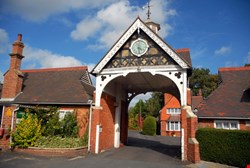
The event, which celebrated the history of women in cyber security and explored the need to encourage more women into the profession, was organised by the Cyber Security Challenge UK and The Women’s Security Society and supported by Raytheon.
Ian Standen, CEO of Bletchley Park, welcomed the attendees to the historic setting. “This was an industrial code-breaking facility”, he explained. “During the Second World War there were over 9000 people on site”.
Baroness Neville-Jones, a patron of the Cyber Security Challenge, then addressed the WWII veterans. “We owe these people a great debt but they’re largely anonymous, and that needs to change. Alan Turin’s name is but one amongst more that should be better known”, she said, before highlighting the opportunities for women in cyber security today. “There’s a great career here with status and recognition across broad swathes of society”, she explained, highlighting that cyber security jobs exist in a huge range of sectors, from the music industry to finance. “Let’s promote these opportunities to our sisters”, she added.
The stories of the Bletchley Ladies were kept secret for years but are now beginning to emerge. Kerry Howard, historian and author, has brought to light the story of one of the top female code-breakers of WWII. Speaking about her research in to the life of graduate mathematician Margaret Rock, who worked on Enigma machine ciphers under the respected code-breaker Dilly Knox, Kerry said “Her department was 90% female – women were absolutely everywhere”. Margaret was described as “the 4th or 5th best of the whole Enigma staff and quite as useful as some of the professors”, yet was only ever referred to as a ‘linguist’, never a code-breaker. Her love of numbers and talent for code-breaking during the war years led to a long and successful career at GCHQ.
The UK’s strong history of women in code-breaking, however, is not reflected by the number of women working in the sector today. At present less than 10% of the workforce is female. Raytheon’s Dr Brooke Hoskins explained the need to support women in a line of work that continues to be predominantly dominated by men. “The Raytheon Women’s Network is trying to change the underrepresentation of women – Bletchley Park was a prime example of how women can take leading roles in the security profession, and our sector can’t afford to miss out on this talent”, she said. Dr Hoskins also discussed the importance of mentoring for women in cyber security roles, drawing on her own career experience.
Stephanie Daman, CEO of the Cyber Security Challenge, made an appeal for women working in cyber security to promote the opportunities in the sector to others. “Take the time to encourage women to see the profession as one they should consider.”
Lucy Robson, a second year undergraduate studying Artificial Intelligence and Computer Science, concluded the speeches. “The cyber security challenge is relentless and we must step up”, she warned. Lucy, one of the first Cyber Security Challenge candidates, won one of the first competitions – the Small Business Network Defence challenge run by QinetiQ and has gone on to work with the company.